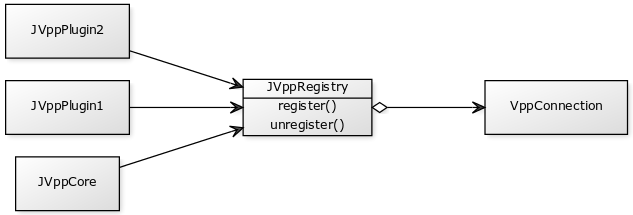Difference between revisions of "VPP/Java API/Plugin support"
From fd.io
(→Problems needs to be solved) |
(→Problems needs to be solved) |
||
| Line 13: | Line 13: | ||
* when JNI code receives reply, it asks the registry for appropriate callback interface and invokes callback method that corresponds to the received message reply | * when JNI code receives reply, it asks the registry for appropriate callback interface and invokes callback method that corresponds to the received message reply | ||
| − | == | + | == TODO == |
| − | |||
| − | |||
* util.py stores workarounds for messages that are not following vpe.api naming conventions. It needs to be extensible, just in case vpp plugins have their own peculiarities | * util.py stores workarounds for messages that are not following vpe.api naming conventions. It needs to be extensible, just in case vpp plugins have their own peculiarities | ||
| − | * | + | * test jvpp_gen package installation on centos7 |
Latest revision as of 15:00, 16 August 2016
This page is a design proposal for Java API to support VPP plugins.
Architecture
Main assumptions
- JVppRegistry holds a map of callback interfaces for JVppCore and plugins (generated together with JNI implementations based on provided api files).
- when API user sends a message, JVppRegistry delegates the call to JNI implementation provided by the particular plugin
- when JNI code receives reply, it asks the registry for appropriate callback interface and invokes callback method that corresponds to the received message reply
TODO
- util.py stores workarounds for messages that are not following vpe.api naming conventions. It needs to be extensible, just in case vpp plugins have their own peculiarities
- test jvpp_gen package installation on centos7
